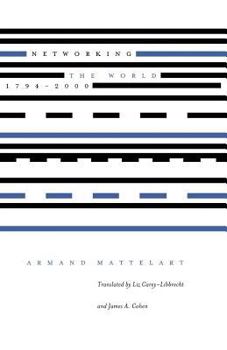Networking the World, 1794-2000
Select Format
Select Condition 
Book Overview
In the age of satellites and the Internet, worldwide communication has become increasingly unified amid overblown claims about the redemptive possibilities of international networks. But this rhetoric is hardly new. As Armand Mattelart demonstrates in Networking the World, 1794-2000, globalization and its attendant hype have existed since road and rail were the fastest way to move information.Mattelart plates contemporary global communication networks into historical context and shows that the networking of the world began much earlier than many assume, in the late eighteenth century. He argues that the internationalization of communication was spawned by such Enlightenment ideals as universalism and liberalism, and examines how the development of global communications has been inextricably linked to the industrial revolution, modern warfare, and the emergence of nationalism. Throughout, Mattelart eloquently argues that discourses of better living through globalization often mask projects of political, economic, and cultural domination.
Format:Paperback
Language:English
ISBN:081663288X
ISBN13:9780816632886
Release Date:January 2000
Publisher:University of Minnesota Press
Length:144 Pages
Weight:0.45 lbs.
Dimensions:0.3" x 5.3" x 8.4"
Customer Reviews
2 ratings
Globalization: New Networks, New Fragmentations
Published by Thriftbooks.com User , 15 years ago
A. Mattelart walks the reader through the main historical stages of the development of world networks. His presentation provides a necessary interpretation to understand the current stage of globalization as the product of specific Western economic strategies. The last part of the book is perhaps more interesting to the reader preoccupied with the impact of globalization on the planet--as a catalyst of new orders, but also as a cause of less evident disorders. As the capitalistic practices from which it stemmed, globalization is a two-edged sword: it brings opportunities of growth and progress as well as risks of fragmentation and evisceration of the social. Thus, for example, one of the main points of the book is the author's denunciation of the danger of the progressive substitution of the citizen by the consumer, that is, the loss of social content to our human condition and relations. The author places the threat of civil war "within each culture. This is where the fate of the globalization /fragmentation dialectic will be decided" (110-11). To avoid that, new strategies of collective resistance will have to be created. This is a challenge that the author does not flesh out in detail, but it's suggestive enough to the reader interested in further examining the topic.
A parroting frenzy of talking heads
Published by Thriftbooks.com User , 18 years ago
Armand Mattelart is a French professor of information and communication theory at the Université de Paris-VIII, Saint-Denis. His book is concisely written at only 123 pages and provides an insightful argument against globalization. Mattelart explains how freedom of speech translates on a global scale to freedom of commerce. The central problem for Mattelart is that by letting corporations network the world, we are letting them control the marketplace of ideas, as if they have shackled the invisible hand of capitalistic self-governance. This inevitably leads, says Mattelart, to what is essentially nothing more than human commodification, such that the marketplace of ideas is essentially a parroting frenzy of talking heads socioeconomically engineered to spread profitable memes.





